Many gold stock traders will hold for the wrong reasons, sell for the wrong reasons, and not buy back for the right reasons
It is one of the most interesting aspects of precious metals investing/trading. This buy/sell for the wrong reasons phenomenon. Many years ago I came up with the graphic below to illustrate how advisers, analysts and their herds focus on the wrong reasons for being bullish on gold miners.
Reenter, the Macrocosm, our rough guide to what is and what is not so important to the fundamental gold mining case. See those tiny planets (China/India love trades and especially, cyclical inflation)? They are tiny for a reason and that reason is that they are inconsequential at best, where supposed fundamentals are concerned.
What I call “cyclical inflation”, that is, inflationary macro management by monetary authorities that at least temporarily works to benefit the economy, and the China/India buying promos have been ineffective themes at best, and disastrous at worst, for gold stock traders who believe in them, since 2008.
As belabored for many years, it is counter-cyclicality and deflationary pressure that will drive gold’s “real” price (measured against commodities, stocks, CPI, etc.) up hard, even if its nominal price remains under wraps. That will be the real monetary value asset, gold, retaining value as its relative price gets marked up within a failing macro.
The Macrocosm (NASA, my markups)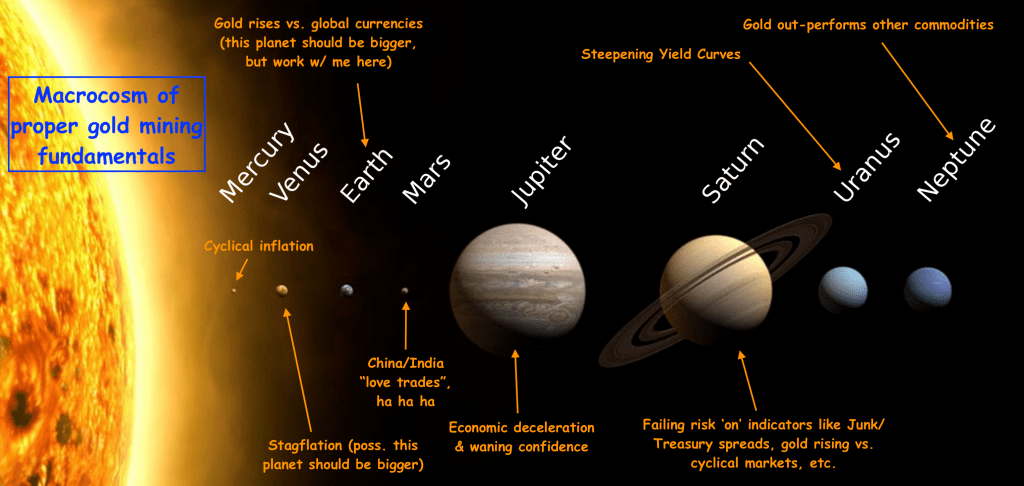
That, in turn, will expand the margins of gold mining operations, all other things being equal. Gold/Energy, Gold/Materials, Gold/Humans, etc. As gold’s ratios to other assets and markets expand, so does the bottom line potential of a gold miner.
For much of the last two decades, the above-noted dynamics only came into play during asset market bears and/or crashes (e.g. 2000, 2008, 2020) before the deflationary situation was quickly mopped up by people like our policy hero, circa 2008-2009…
The Hero (The Atlantic)
It was truly heroic – if long-term damaging to the system – as the bull market in stocks birthed by policy panic begun in 2008, endures to this day.
Do we have proper gold mining fundamentals in line today? Well, gold’s ratios to cyclical markets are grinding into place quite nicely. The monetary metal is firmly trending up vs. commodities per this weekly chart. That feeds what I call gold mining “sector” fundamentals. However, there is a vulnerability in gold stocks to a future broad stock market bear, as there is not yet a definitive change in trend vs. stock markets and the miners are merely among the leaders of a wider rally, including many highly speculative asset markets. The gold miners are not yet unique.
Gold Ratios, weekly (Stockcharts.com)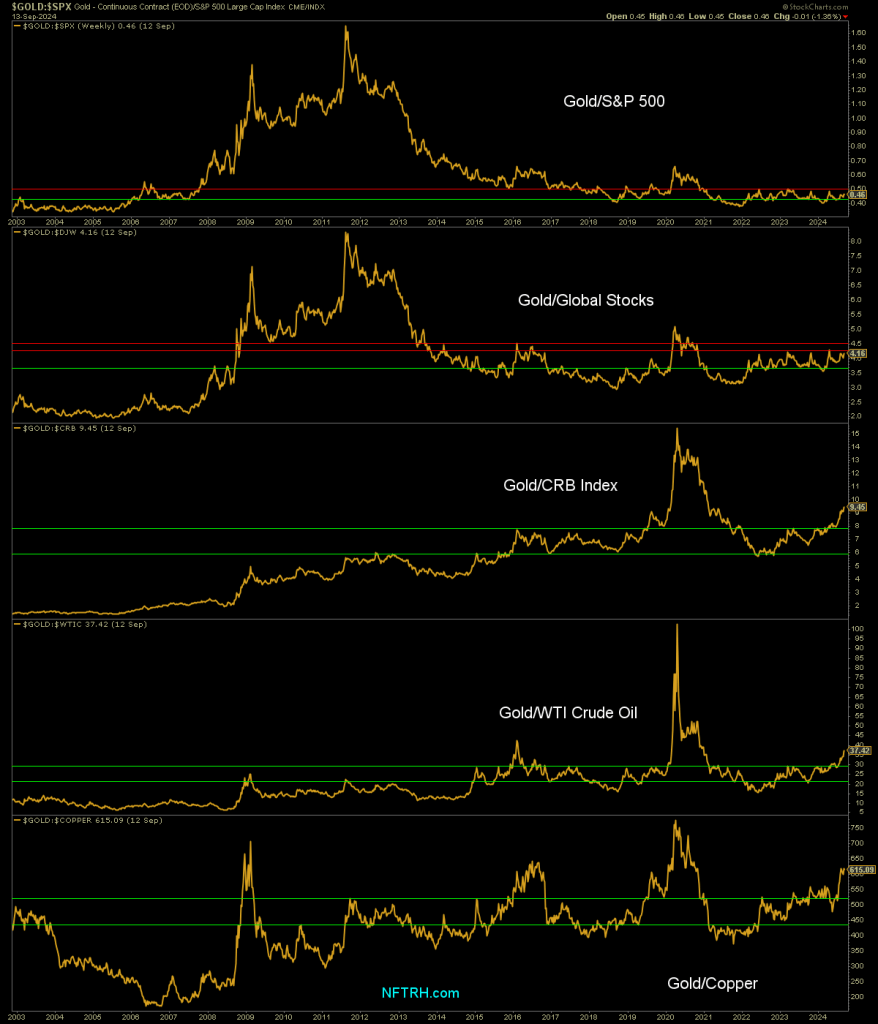
And that is okay, for now. But there is likely to be a “SELL” call on the sector at some possibly much higher level than today’s. That will be due to broad market correlation and vulnerability. Recall gold stock traders panic selling en mass, leading the market crash in 2008 because “failing inflation!!”, because “deflation!”, because “gold is dropping!”
But in relation to cyclical and inflation-sensitive markets gold rammed higher during the last two deflationary episodes, in 2008 and 2020. Those were times to buy, as mining stocks crashed. You can bet that inflation-centric gold bugs were bailing out because… “OMG, no INFLATION!“
Gold Ratios, monthly (Stockcharts.com)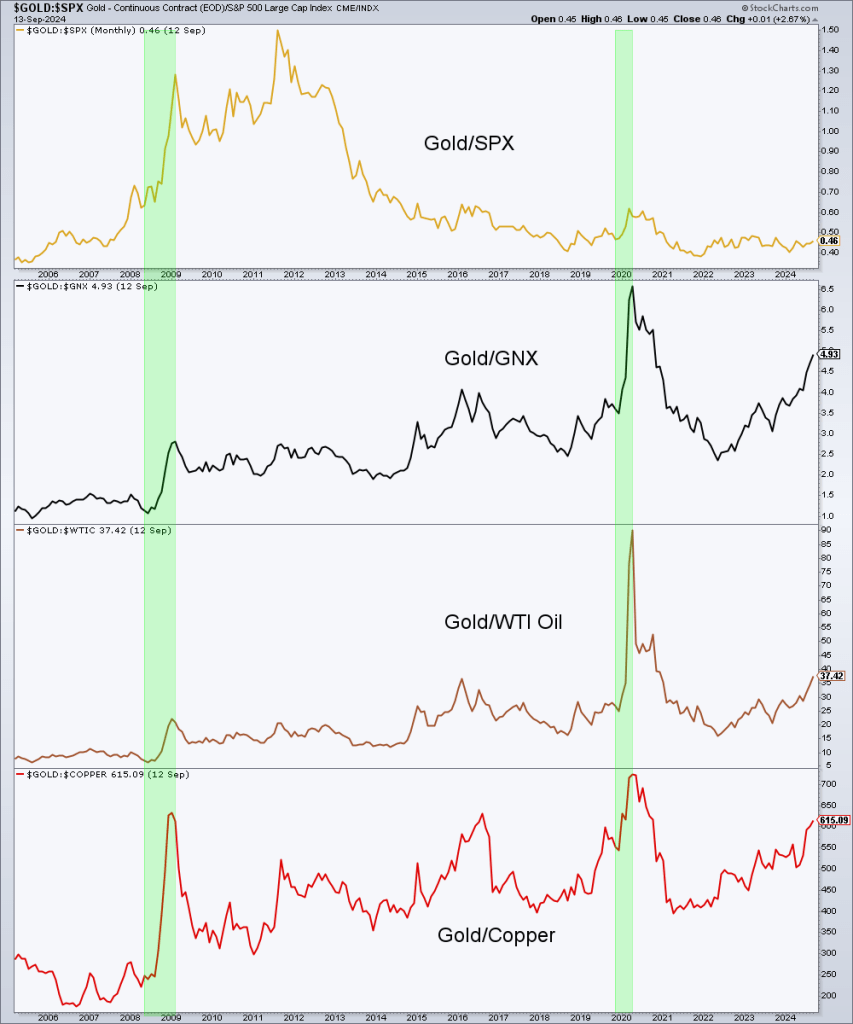
A future long-term bull market may result from the lack of future ‘unsuccessful’ inflation operations (unlike the 2004-2022 period). But again, first comes the “vulnerability” theme, after whatever highs are made on the current bull leg.
The “macro” fundamentals, which will influence mainstream investors when gold reasserts vs. stock markets are still in progress, baking in the oven. The above-noted “sector” fundamentals are doing quite well, as gold handily out-performs cyclical commodities, including gold mining cost drivers. The fundamental situation is positive now, and will improve after stocks (likely including gold mining stocks) top out. Then will come the longer bull market that could run through the rest of the decade (just riffing here).
The crux of our current big picture macro theme is that the implications of a broken macro, per the 30yr Treasury Yield (Continuum’s) broken long-term trend, is that our policy heroes may and probably will try to effectively reflate the system, but due to saturation of the bond market (the Fed’s decades-long management/manipulation tool), the results will not be the same happy ones as in previous episodes. There is a rebellion by the carriers of the massive debt of the USA and it will impair a formerly all-powerful Fed’s ability to control things at will on future down cycles. This was the old way (folks, it’s just my attempt to make a colorful point)…
The Fed was once in total control (Wikipedia)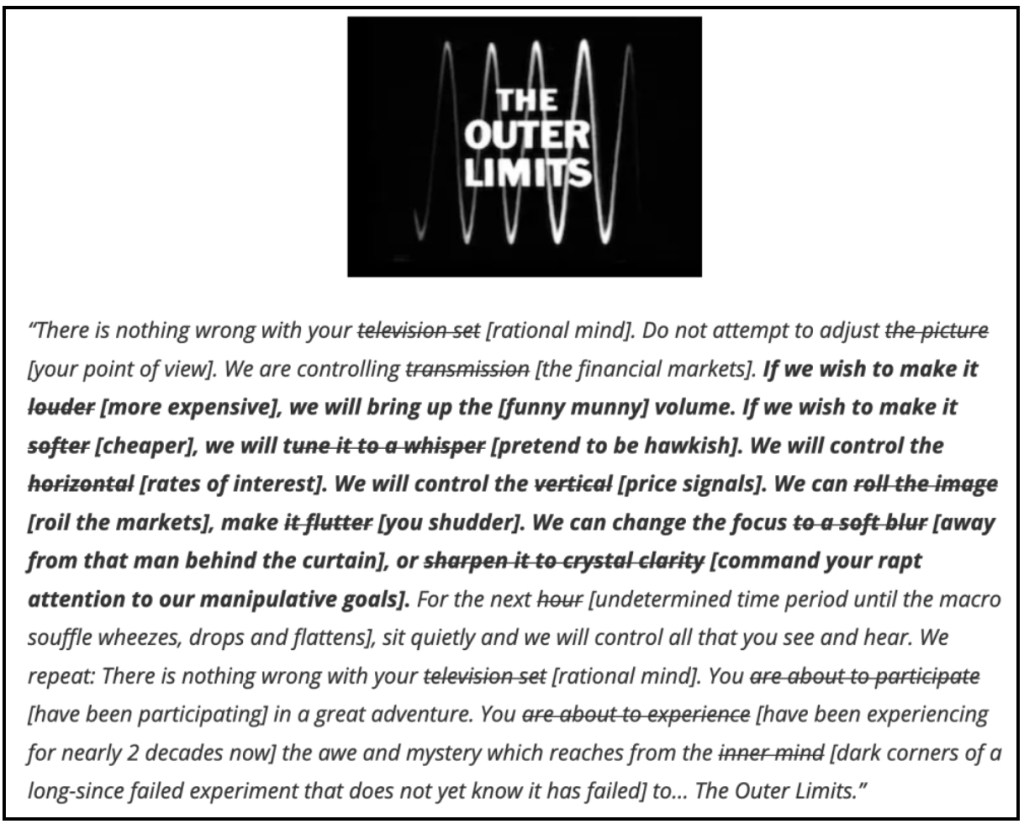
…but ineffective battles against both deflation and inflation, a veritable pulling back of the curtain of invincibility, may be the new way.
The Wizard (YouTube screen grab)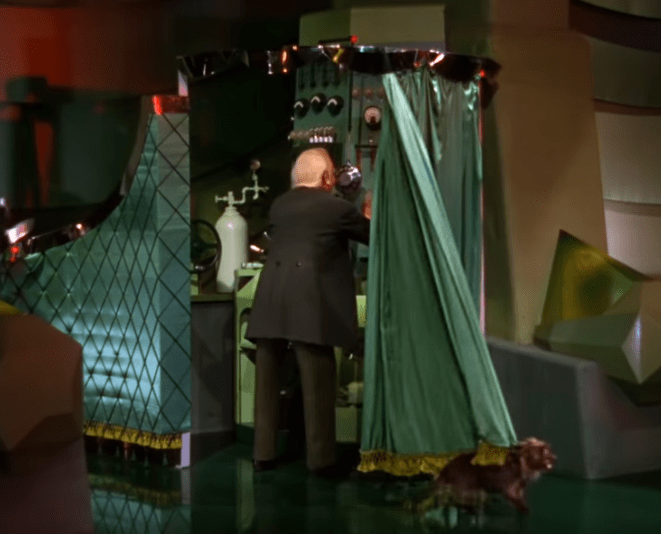
As to the Continuum, the trend is broken, but “yields are declining now”, you say? Yes, and right on schedule per our analysis of a disinflationary (Goldilocks) to deflationary macro swing we have been managing for nearly 2 years now. The implications of the Continuum’s trend break would come into play after this pullback to test the breakout plays out (targeting the 3.3% area).
So I am talking my book, and that book calls for this easing of inflationary pressures in the current phase, but also future policy constraints when it is time for whatever policy “Hero” is in charge to spring into action against deflation.
30yr Treasury Yield (Stockcharts.com)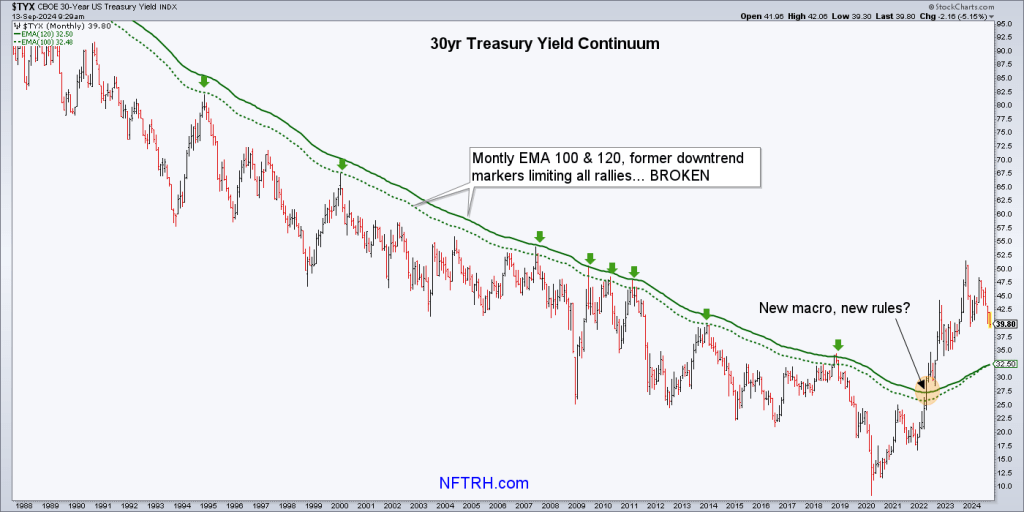
For several reasons that are beyond the scope of this article, I expect a tragic ending to the stock market arm of the “Everything Bubble” instigated by hyper-easy policy. Anything correlated positively with it is likely to be vulnerable when the machines, quants and multitudes of traders start selling in unison, just as they buy in unison today. And don’t forget the margin man. He will want his due, and he won’t care what you have to liquidate to get it.
But on the big picture, the much bemoaned HUI/Gold ratio (HGR) as been a righteous indicator of a generally poor gold mining fundamental backdrop. Its 20 year decline was logical, and you should not let belly aching and excuse making influence you otherwise. But thus far the gold mining rally is valid by this important internal indicator. I expect the HGR to continue leading into whatever top is out ahead. Longer-term, after a deflationary liquidation clears the macro, a new bull market in this internal indicator may even ensue.
HUI/Gold Ratio (stockcharts.com)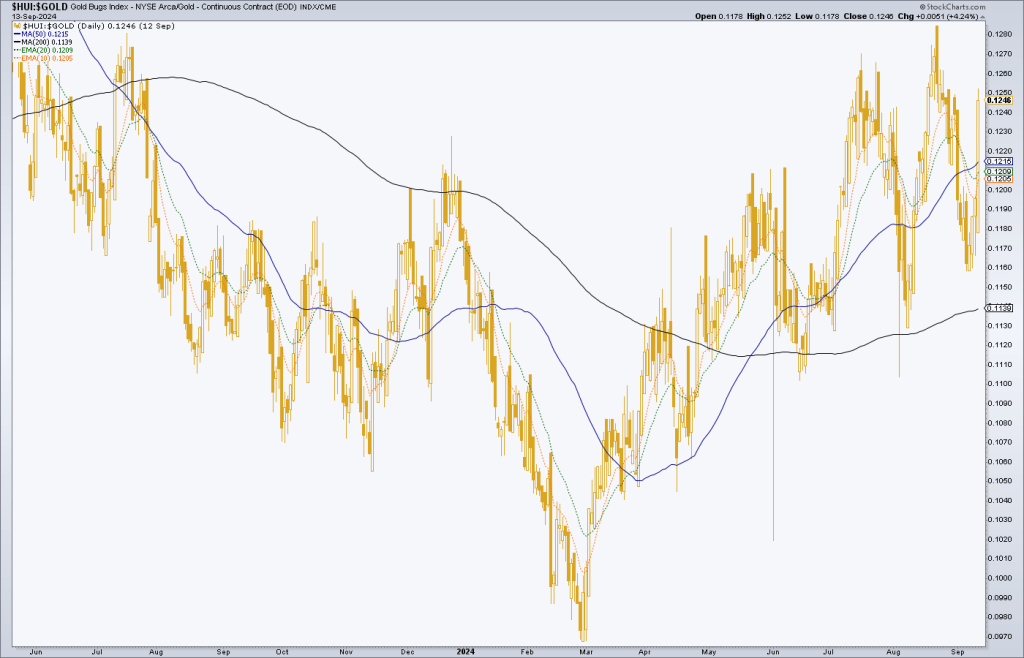
We have been on the mark since effectively managing the 2020 crash, the inflationary recovery from that crash, and most recently managing the “new macro” picture and the current Goldilocks/disinflation situation within it. Actually, on the big picture we’ve been in step with the markets analytically, since inception right into the jaws of the oncoming market crash in Q4, 2008.
It is important to note the above, because this is not a perma (gold stock) bull you are reading. When the macro was bad, we called it bad. It is no longer bad for the gold mining industry, and it’s improving slowly but consistently.
One thing is for sure. We need to manage modern markets with an independent mindset and not follow stale and debunked theories about why the gold stock sector “should have been” bullish. The HUI/Gold ratio was not wrong. It was very right. If your assumptions are wrong, then your entire analytical framework is built on an error. The assumption that cyclical inflation was going to bull gold stocks was a pervasive, destructive and ongoing error.
Bottom Line
The current trade is already quite profitable, but when it ends it will likely end in rude fashion, if current trends and market correlations remain intact. Then, amid deflationary fears upon the macro, the average gold stock trader will not be buying the destruction. But that will be the time to position for a longer-term bull phase. That could be years out from here.
Meanwhile, let’s enjoy the current trade, but also understand it for what it is, a cyclical bull phase against improving fundamentals with one nagging issue, a currently positive correlation to high risk cyclical markets (again, to talk my book, I have several positions in those markets as well, as we manage the perhaps final stages of the broad bull).
Read the full article here
